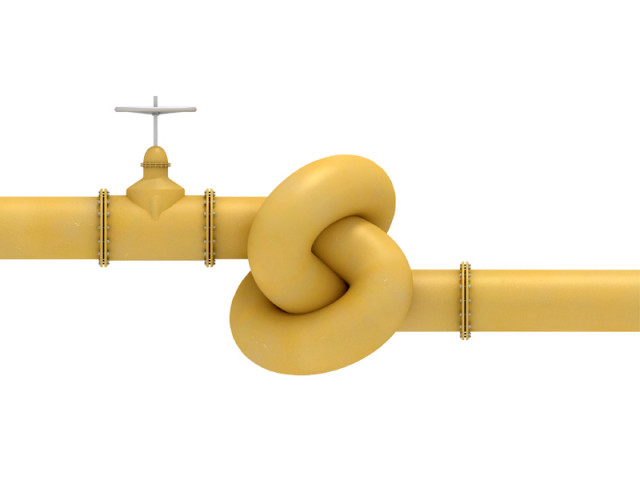Royalty payment: Provinces demand gas supply instead of cash
Centre, provinces put their heads together today to reach solution.

Royalty payment: Provinces demand gas supply instead of cash
Earlier, the Centre and the provinces had differences over regulation of the upstream petroleum industry, forming zones, wellhead gas price and royalty collection in kind or cash. They have resolved all issues except for how the royalty will be collected.
The Council of Common Interests (CCI) has already approved in principle the Petroleum (Exploration and Production) Policy 2012 in the second week of February.
Following the passage of the 18th Constitutional Amendment, the central government has been in a fix over how to tackle the gas shortage in the country. Article 158 of the Constitution empowers provinces to meet their requirements first before giving gas to other provinces. Punjab claims that it is being hit by gas crisis due to legal constraints.
Sources told The Express Tribune that the central government and provinces were engaged in negotiations to come up with a formula to define whether the latter should be given royalty on oil and gas in “cash or kind”.
In the wake of the recent severe gas crisis, provinces have pressed the government to give them 12.5 per cent royalty in kind in place of cash.
In the current mechanism, the central government collects 12.5 per cent royalty on crude oil and natural gas and then transfers it to the provinces after deducting two per cent administrative charges. The royalty does not become part of consolidated funds and net proceeds are transferred to the provinces.
The central government has collected Rs34 billion in royalty so far this fiscal year. In 2010-11, Punjab received Rs1 billion royalty on gas, Sindh Rs26 billion, Balochistan Rs4 billion and Khyber-Pakhtunkhwa Rs4 billion.
Provinces have also demanded direct transfer of royalty but the Centre insists that it is legally empowered to collect the royalty and then transfer it to the provinces.
Exploration zones
The central government has agreed to restore three zones for oil and gas exploration due to different geological circumstances. However, average wellhead price will remain uniform at $6 per million British thermal units (mmbtu).
Earlier under the new petroleum policy, the government had abolished the three zones with varying wellhead prices and formed a single zone.
In the previous petroleum policy of 2009, the average wellhead price was $4.5 per mmbtu. The proposed wellhead price for offshore fields was $9 per mmbtu that has been reduced to $8 per mmbtu.
Regulation of upstream industry
After the 18th Amendment, provinces have 50 per cent ownership rights over oil and gas resources and claimed legal right to regulate the upstream petroleum sector. The issue has been resolved as the provinces have agreed that their representative will be part of the Concessions Award Committee as well as the Directorate of Petroleum Concessions to regulate the upstream industry.
Published in The Express Tribune, February 29th, 2012.



















COMMENTS
Comments are moderated and generally will be posted if they are on-topic and not abusive.
For more information, please see our Comments FAQ